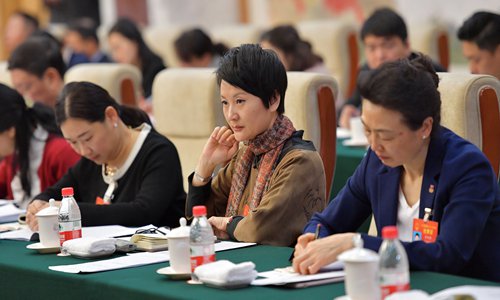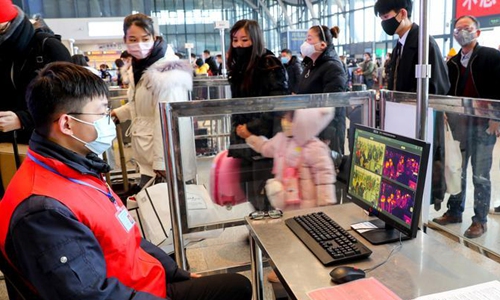TWO SESSIONS 2020 / 小图DEPUTY
HK, Hubei lawmakers, political advisors await details of travel to Beijing as ‘two sessions’ dates announced

Photo: VCG
As China announced the widely anticipated opening date of this year's plenary session of the National People's Congress (NPC) on May 22, several lawmakers and political advisors especially those from the virus hardest-hit Hubei Province and Hong Kong said they are anxiously waiting for more details on how to go to Beijing to attend the country's most important political event, as strict prevention measures are still in place against the COVID-19 epidemic.
Many said that they have also prepared several motions and proposals and suggestions related to the health crisis, as the coronavirus outbreak has left Chinese people an unforgettable spring and accordingly delayed the NPC plenary session and the annual session of the National Committee of the Chinese People's Political Consultative Conference (CPPCC), known as the "two sessions," for the first time in decades.
Yung Chan, an NPC deputy and vice-chairman of the Democratic Alliance for the Betterment and Progress of Hong Kong, told the Global Times that he is still waiting for more detailed arrangements for deputies from Hong Kong to Beijing, including whether they will arrive by chartered flights or whether they will need to undergo the 14-day quarantine.
Wu Zhiliang, a member of the CPPCC National Committee and president of the Board of Directors, the Macao Foundation, told the Global Times that he does not know if he and his other colleagues from Macao will have to undergo quarantine when they arrive in Beijing.
Hu Shengyun, a senior rocket engineer at the China Aerospace Science and Industry Corporation and deputy to the 13th National People's Congress from Wuhan, Central China's Hubei Province, told the Global Times that he just learned the exact date on Wednesday morning and had not received any notice from the provincial's organizing committee.
As a deputy from Wuhan, he is anxious to know more about the details and medical procedures that he needs to undergo before coming to Beijing.
Currently, returnees from Wuhan to Beijing are required to conduct nucleic acid tests; one in Wuhan, within seven days before the fixed arrival date to Beijing, and one after their 14-day quarantine in Beijing, the Global Times has learned.
They also need to submit their personal information, such as health information, return date and personal ID from the Wuhan residential committee to the Beijing municipal government, for the latter to approve.

An employee of Wuhan train station in Central China's Hubei Province observes passengers' body temperature on January 21 amid outbreak of the novel coronavirus pneumonia. Photo: China News Service
Train tickets are tight, with those from Wuhan to Beijing available only on May 3 and 6.
An employee from a Wuhan residential community said they won't submit return applications for after May 5th, but did not elaborate on the reason why. Policies for quarantine vary according to different Beijing districts, for instance, Chaoyang district, the only district in China with a "high risk" of COVID-19 infection, imposed a 21-day stay-at-home policy for Wuhan returnees, the Global Times has learned.
A few hours after the dates for the two sessions were announced, Beijing announced to lower its epidemic emergency response from the top level to level II, taking effect from Thursday, after the capital city recorded zero new imported and domestically transmitted cases for 13 consecutive days.
On Wednesday's press conference, officials from Beijing municipal government announced that the city will not require domestic arrivals to provide a negative nucleic acid report before checking in to hotels as long as they can present the green health code.
The capital city also lifted the 14-day quarantine requirement for people from low-risk areas in China. But the requirement remains in place for people from Hubei Province (including Wuhan) and medium-and high-risk areas as well as international arrivals.
Several NPC deputies and CPPCC National Committee members from South China's Guangdong Province also expressed their hopes for more details.
A member from a local committee for organizing NPC deputies and CPPCC National Committee members to come to Beijing told the Global Times on condition of anonymity that they are required to update their health conditions including body temperature, information on places they have been to and people they have contacted on a platform. They have been arranged to undergo nucleic acid tests and if they come back negative, they will book group tickets for Beijing and stay in a designated hotel.
"We are required not to come into contact with irrelevant personnel until the two sessions finish," the member said.
The Global Times reporters also reached two officials, one in Ningxia Hui Autonomous Region and another in Northwest China's Shaanxi Province, who were responsible for organizing local deputies and members to come to Beijing in last year's two sessions. Both said they have not received any notice from Beijing.
"We were prepared before Spring Festival. Big changes may be made in the following days," the official from Shaanxi said. He suspected that the deputies and members may not need to be quarantined and reports of nucleic acid tests in Shaanxi and Beijing are sufficient.
Foreign reporters also expressed their anticipation of coming to Beijing to cover this meeting.
A Pakistani reporter who covered the meeting last year told the Global Times that he usually received the invitation letter a month before the event, but has not received any notice so far.
Another reporter in Japan who has covered the meeting for several years told the Global Times that he is worried that he will be quarantined for 14 days and is currently coordinating with Chinese authorities.
"Reporters from foreign media as well as overseas Chinese delegates who are invited to give advice at the CPPCC National Committee session will face a problem," the reporter said. Currently, international arrivals bound for Beijing will be diverted to 12 designated entry ports in nearby cities, and all arrivals in Beijing must receive nucleic acid tests and undergo 14-day quarantines.
